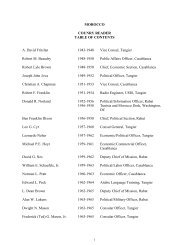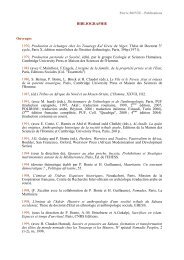- Page 1:
Disputed desert
- Page 4 and 5:
Cover illustration: painting of Tam
- Page 7 and 8:
ContentsList of photos ixList of ta
- Page 9 and 10:
List of photos1.1 Bouyagui ould Abi
- Page 11 and 12:
But of course, most important were
- Page 13 and 14:
names, which I have found in many d
- Page 15 and 16:
urnousCantonCerclecheick (Ar.)Comma
- Page 17 and 18:
tayitetefoghessategezéteghereteher
- Page 19 and 20:
POLISARIOPSIPSPTSCTIUDPMUMADDUNHCRU
- Page 21 and 22:
Movement Date of creation Motivatio
- Page 23 and 24:
FM 62 Afaires Politiques: AOF-AEF (
- Page 25 and 26:
for his generosity in providing me
- Page 27 and 28:
IntroductionWhat is Alfellaga and w
- Page 29 and 30:
INTRODUCTION 3On a political map of
- Page 31 and 32:
INTRODUCTION 5most anthropologists
- Page 33 and 34:
INTRODUCTION 7Free - unfree. The ma
- Page 35 and 36:
INTRODUCTION 9tewsit is that of a w
- Page 37 and 38:
INTRODUCTION 11ideal of temet and t
- Page 39 and 40:
INTRODUCTION 13groups were regroupe
- Page 41 and 42:
INTRODUCTION 15formally sworn to se
- Page 43 and 44:
INTRODUCTION 17a poem valuable is t
- Page 45 and 46:
INTRODUCTION 19Their reports reflec
- Page 47 and 48:
INTRODUCTION 21independence led to
- Page 49 and 50:
Creating Mali1From the 1960s onward
- Page 51 and 52:
Competing nationalismsCREATING MALI
- Page 53 and 54:
CREATING MALI 27achieved. In fact,
- Page 55 and 56:
CREATING MALI 29Keita and the Seneg
- Page 57 and 58:
CREATING MALI 31sions. 17 More impo
- Page 59 and 60:
CREATING MALI 33colonial administra
- Page 61 and 62:
CREATING MALI 35Koutiala, Bougouni,
- Page 63 and 64: CREATING MALI 37Azawad areas, the f
- Page 65 and 66: CREATING MALI 39tribe in Gourma Rha
- Page 67 and 68: CREATING MALI 41tical party, the Na
- Page 69 and 70: CREATING MALI 43One problem in the
- Page 71 and 72: CREATING MALI 45Of all the officers
- Page 73 and 74: CREATING MALI 47According to Bruce
- Page 75 and 76: CREATING MALI 49arrival he organise
- Page 77 and 78: CREATING MALI 51sion. 79 At its ina
- Page 79 and 80: CREATING MALI 53balance yet. The Na
- Page 81 and 82: CREATING MALI 55the means to stop t
- Page 83 and 84: CREATING MALI 57Moroccan AJM member
- Page 85 and 86: CREATING MALI 59This was perhaps du
- Page 87 and 88: CREATING MALI 61jihad-states and th
- Page 89 and 90: CREATING MALI 63national radio. Eac
- Page 91 and 92: CREATING MALI 65to higher ranks to
- Page 93 and 94: CREATING MALI 67searchers studying
- Page 95 and 96: CREATING MALI 69rule: a means to ta
- Page 97 and 98: CREATING MALI 71rally, were arreste
- Page 99 and 100: CREATING MALI 73policies. To purge
- Page 101 and 102: RACE, STEREOTYPES AND POLITICS 75Af
- Page 103 and 104: RACE, STEREOTYPES AND POLITICS 77Bu
- Page 105 and 106: RACE, STEREOTYPES AND POLITICS 79re
- Page 107 and 108: RACE, STEREOTYPES AND POLITICS 81by
- Page 109 and 110: RACE, STEREOTYPES AND POLITICS 83so
- Page 111 and 112: RACE, STEREOTYPES AND POLITICS 85th
- Page 116 and 117: 90 CHAPTER 2population of Mali had
- Page 118 and 119: 92 CHAPTER 2The bellah questionOne
- Page 120 and 121: 94 CHAPTER 2lished. Many slaves ind
- Page 122 and 123: 96 CHAPTER 2luctant to send their c
- Page 124 and 125: 98 CHAPTER 2to emancipate the bella
- Page 126 and 127: 100 CHAPTER 2Government. It will be
- Page 128 and 129: 102 CHAPTER 21,083,304.55 Francs. 7
- Page 130 and 131: 104 CHAPTER 2without him filing com
- Page 132 and 133: 106 CHAPTER 2checked. By 1961, the
- Page 134 and 135: 108 CHAPTER 2dullah Faysal who had
- Page 136 and 137: 110 CHAPTER 2nearly two months. Thi
- Page 138 and 139: 112 CHAPTER 2Nomad anarchyBesides b
- Page 140 and 141: Mali’s mission civilisatrice3In h
- Page 142 and 143: 116 CHAPTER 3among the Kel Adagh wh
- Page 144 and 145: 118 CHAPTER 3agreement on good term
- Page 146 and 147: 120 CHAPTER 3clusion by the state a
- Page 148 and 149: 122 CHAPTER 3incorporation in the M
- Page 150 and 151: 124 CHAPTER 3portance in the buildu
- Page 152 and 153: 126 CHAPTER 3Attaher has said he wi
- Page 154 and 155: 128 CHAPTER 3infrastructural invest
- Page 156 and 157: 130 CHAPTER 3Diallo gave a very viv
- Page 158 and 159: 132 CHAPTER 3made sedentary life le
- Page 160 and 161: 134 CHAPTER 3Fasobara and the Servi
- Page 162 and 163: 136 CHAPTER 3crucial point: Israel
- Page 164 and 165:
138 CHAPTER 3nation in the 19 th an
- Page 166 and 167:
140 CHAPTER 3Officially the new tax
- Page 168 and 169:
142 CHAPTER 3Table 3.4 Average numb
- Page 170 and 171:
144 CHAPTER 3analyses, and, if not
- Page 172 and 173:
146 CHAPTER 3gerian independence. T
- Page 174 and 175:
148 CHAPTER 3themselves. The French
- Page 176 and 177:
150 CHAPTER 3ways in which tax coll
- Page 178 and 179:
152 CHAPTER 3Intekoua ward. Have yo
- Page 180 and 181:
154 CHAPTER 4the defiance of Alla a
- Page 182 and 183:
156 CHAPTER 4number of his relative
- Page 184 and 185:
158 CHAPTER 4self. Elledi could do
- Page 186 and 187:
160 CHAPTER 4We had no ideological
- Page 188 and 189:
162 CHAPTER 4gha engaged himself in
- Page 190 and 191:
164 CHAPTER 4to the rebels in Alger
- Page 192 and 193:
166 CHAPTER 4geographical and histo
- Page 194 and 195:
168 CHAPTER 4military goum units of
- Page 196 and 197:
170 CHAPTER 4Saloum raided the goum
- Page 198 and 199:
172 CHAPTER 4of his comrade, and th
- Page 200 and 201:
174 CHAPTER 4successful raid was he
- Page 202 and 203:
176 CHAPTER 4hand, akafal is the la
- Page 204 and 205:
178 CHAPTER 4Reply - We fled from t
- Page 206 and 207:
180 CHAPTER 4pounding grain, fetchi
- Page 208 and 209:
182 CHAPTER 4Photo 4.1Captured rebe
- Page 210 and 211:
184 CHAPTER 4Diby’s ovenWorst of
- Page 212 and 213:
186 CHAPTER 4had been taken prisone
- Page 214 and 215:
188 CHAPTER 4difficulties in pressi
- Page 216 and 217:
190 CHAPTER 4Tamasheq veil and turb
- Page 218 and 219:
Revolution: Teshumara andand Tanekr
- Page 220 and 221:
194 CHAPTER 5TeshumaraThe Tamasheq
- Page 222 and 223:
196 CHAPTER 5a number of young chil
- Page 224 and 225:
198 CHAPTER 5were struck just as ha
- Page 226 and 227:
200 CHAPTER 5common practice by all
- Page 228 and 229:
202 CHAPTER 5MigrationThe droughts
- Page 230 and 231:
204 CHAPTER 5important of these cen
- Page 232 and 233:
206 CHAPTER 5but to take up manual
- Page 234 and 235:
208 CHAPTER 5molested at the Libyan
- Page 236 and 237:
210 CHAPTER 5Not only dietary habit
- Page 238 and 239:
212 CHAPTER 5the Kaaba in Mecca or
- Page 240 and 241:
214 CHAPTER 5guitar music, the taka
- Page 242 and 243:
216 CHAPTER 5lim world and the new
- Page 244 and 245:
218 CHAPTER 5The nicknames tagged o
- Page 246 and 247:
220 CHAPTER 5belonging to a state.
- Page 248 and 249:
222 CHAPTER 5the rich Arabs support
- Page 250 and 251:
224 CHAPTER 5military power; religi
- Page 252 and 253:
226 CHAPTER 5The Nietzsche-inspired
- Page 254 and 255:
228 CHAPTER 5I have a question for
- Page 256 and 257:
230 CHAPTER 5The various currents w
- Page 258 and 259:
232 CHAPTER 5Me:Sallah:Me:Sallah:Wh
- Page 260 and 261:
234 CHAPTER 5The importance of terr
- Page 262 and 263:
236 CHAPTER 5A first conflict withi
- Page 264 and 265:
238 CHAPTER 5The creation of the FP
- Page 266 and 267:
240 CHAPTER 5cutive office met with
- Page 268 and 269:
242 CHAPTER 5They serve as an expla
- Page 270 and 271:
244 CHAPTER 5Leadership remained in
- Page 272 and 273:
246 CHAPTER 5or ‘executions of tr
- Page 274 and 275:
248 CHAPTER 5au Désert in Tessalit
- Page 276 and 277:
250 CHAPTER 6repeated attacks by re
- Page 278 and 279:
252 CHAPTER 6the autochtonous Malia
- Page 280 and 281:
254 CHAPTER 6the practically unarme
- Page 282 and 283:
256 CHAPTER 6up other positions wit
- Page 284 and 285:
258 CHAPTER 6special permits, as di
- Page 286 and 287:
260 CHAPTER 6problematic. In 1979,
- Page 288 and 289:
262 CHAPTER 6sheq from Mali. Moreov
- Page 290 and 291:
264 CHAPTER 6The year nineteen hund
- Page 292 and 293:
266 CHAPTER 6other side of reality
- Page 294 and 295:
268 CHAPTER 6allies only a short de
- Page 296 and 297:
270 CHAPTER 6(which, at that point,
- Page 298 and 299:
272 CHAPTER 6signing of the Nationa
- Page 300 and 301:
274 CHAPTER 6ponsibility for the mi
- Page 302 and 303:
276 CHAPTER 6lose what they thought
- Page 304 and 305:
278 CHAPTER 6camps at the Mali-Maur
- Page 306 and 307:
280 CHAPTER 6Masters of the Land: F
- Page 308 and 309:
282 CHAPTER 6chief dominancy within
- Page 310 and 311:
284 CHAPTER 6was ousted from its ba
- Page 312 and 313:
286 CHAPTER 6perhaps with the help
- Page 314 and 315:
288 CHAPTER 6respond in attacking S
- Page 316 and 317:
290 CHAPTER 6by and watched. 67 The
- Page 318 and 319:
292 CHAPTER 6chief. And he said to
- Page 320 and 321:
294 CHAPTER 6May 1994, the rebellio
- Page 322 and 323:
296 CHAPTER 6under rebel attacks. 7
- Page 324 and 325:
298 CHAPTER 6pite evidence to the c
- Page 326 and 327:
300 CHAPTER 6ants; would not carry
- Page 328 and 329:
302 CHAPTER 6had toured the surroun
- Page 330 and 331:
304 CHAPTER 6can also exist between
- Page 332 and 333:
306 CHAPTER 6arms in Northern Mali
- Page 334 and 335:
Conclusion7I began the introduction
- Page 336 and 337:
310 CHAPTER 7The last competitor wa
- Page 338 and 339:
312 CHAPTER 7political entities con
- Page 340 and 341:
314 CHAPTER 7society. Whether the
- Page 342 and 343:
EpilogueThe rebellion ended but des
- Page 344 and 345:
318 EPILOGUEreceived electricity. A
- Page 346 and 347:
320 EPILOGUEadministrative office i
- Page 348 and 349:
322 EPILOGUEpolitical elite had ass
- Page 350 and 351:
324 EPILOGUEContrary to what more s
- Page 352 and 353:
326 EPILOGUEOctober 2004, El Para w
- Page 354 and 355:
328 EPILOGUEthe tribal structure or
- Page 356 and 357:
330 EPILOGUEHe quickly became the c
- Page 358 and 359:
332 EPILOGUE10. the democratic defi
- Page 360 and 361:
334 EPILOGUEkilling one of the GSPC
- Page 362 and 363:
336 EPILOGUEnumber of warriors, inc
- Page 364 and 365:
338 EPILOGUEkeep the peace as much
- Page 367 and 368:
ReferencesAG AHAR, E. (1991), L’i
- Page 369 and 370:
REFERENCES 343BRUIJN, DE, M. & H. V
- Page 371 and 372:
REFERENCES 345GILMORE, D.D. (1987),
- Page 373 and 374:
REFERENCES 347LAMP, F. (1996), Danc
- Page 375 and 376:
REFERENCES 349ROSSILLION, C. (1966)
- Page 377 and 378:
REFERENCES 351CHEIK OUMAR SISSOKO,
- Page 379 and 380:
REFERENCES 353La route des esclaves
- Page 381 and 382:
REFERENCES 355BERGE, G. (2000), In
- Page 383:
REFERENCES 357DiscographyAFEL BOCOU
- Page 386 and 387:
360 INDEXath-Thawra · 263ATNMC ·
- Page 388 and 389:
362 INDEXGoundam · 18, 35-39, 44,
- Page 390 and 391:
364 INDEXMohamed Najim · 97, 119,
- Page 392:
366 INDEX266, 273, 276, 278, 288, 2









